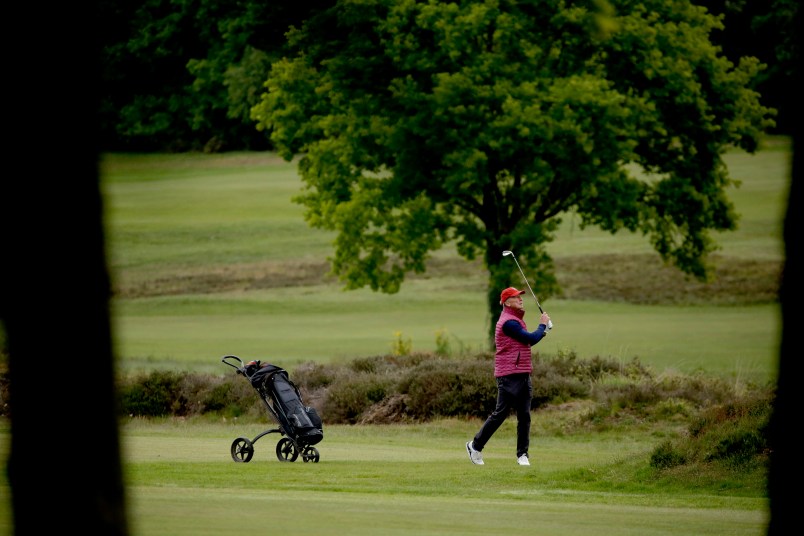LONDON (AP) — The sound of a crisply struck golf ball, not to forget the occasional hack, could be heard in England for the first time in nearly two months as courses reopened Wednesday as part of a modest easing of coronavirus lockdown restrictions.
People in England are allowed to exercise more than once a day and with one person from outside their household, provided they remain two meters (around 6.5 feet) apart. Other sporting activities, such as tennis and swimming in lakes and fishing, are allowed too.
In addition, stores selling gardening supplies can reopen, while potential house buyers or renters can visit properties in person. And, most importantly in the context of getting the ailing British economy back on its feet, people who can’t work from home, such as those in construction and manufacturing, are being encouraged to return to their place of work if they can do so safely.
The lifting of some restrictions, first announced by U.K. Prime Minister Boris Johnson on Sunday, applies only in England. The semi-autonomous governments of Scotland, Wales and Northern Ireland are going more slowly and sticking with the “Stay Home” message.
The four parts of the U.K. have moved as one during the lockdown, which has been in place since March 23, but are starting to take different approaches during the easing phase.
Johnson justified the modest easing on the grounds that Britain has passed the peak of the outbreak. Over a seven-day rolling average, the U.K.’s daily death toll has fallen over the past month. The U.K. has officially recorded the most coronavirus-related deaths in Europe, more than 32,000, a toll second only to the United States.
Critics of the U.K. government say the changes to the lockdown, spelled out in a 50-page document, are confusing and potentially dangerous — especially when it comes to returning to work.
Johnson denied that there has been mixed messaging and told lawmakers that “the common sense of the British people is shining through.”
One of the main points of concern has centered on how those who can’t do their job from home travel to their place of work given the social distancing requirements.
Carl Moss, 39, a gardener at St Thomas’ Hospital in central London, said it’s been “busier today” and that he’d seen “more office, finance-type people” than before when he’d mainly see tradesmen.
“I think the economy needs to start getting back together but it’s still unclear at the moment for some people,” he said.
Figures earlier showed that the British economy is heading for a very deep recession after contracting by 5.8% in March alone, even though the lockdown was only in place for just a week.
The government advice, repeated again in Parliament on Wednesday by Johnson, is that people should avoid using public transit if possible. But for many people, that’s impossible, raising anxieties over what they should do, especially if they have children and schools remain shut.
Transport Secretary Grant Shapps said the government would have to take steps if too many people packed onto buses and subways.
“We are asking people to be very sensible and not flood back to public transport,” he told Sky News.
The changes in the guidelines have also caused some confusion beyond work-related and transport issues, as people find it strange that they can’t visit their relatives or friends at their homes but can put in a bid to buy a home.
Fines for those who break the rules have been increased as part of a carrot-and-stick approach designed to ensure that people operate within the guidelines.
National Police Chiefs’ Council chairman Martin Hewitt said officers would “continue to use common sense and discretion” in policing the new rules.
“The efforts of the public mean police officers have rarely had to enforce the government regulations so far,” he said. “I am confident the vast majority will continue to do their bit and follow guidance in this next stage.”
___
Follow AP pandemic coverage at http://apnews.com/VirusOutbreak and https://apnews.com/UnderstandingtheOutbreak







Wow, this article is a piece of dangerous puffery. I know it’s hard to do actual reporting in a pandemic, but relying on known-dishonest government spokespeople with a tiny leavening of critics and no indication who is telling the truth…
Where’s the puffery? It’s a pretty good example of straight reporting. Nowhere in the article does it say that the Tory government has made a great choice to accelerate the restart of the economy.
Nowhere in the article does it say that certain parts of the plan, like lots of people going to work using public transit, are essentially self-contradictory. Instead, there’s a tiny hint the issue might be problematic.